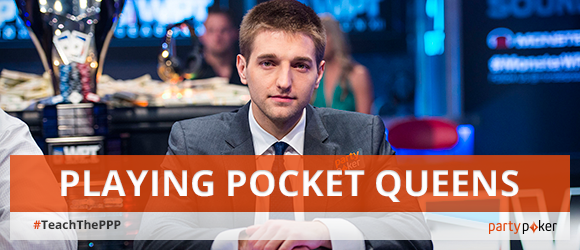by Tony Dunst
Pocket queens are unquestionably a premium hand in no limit Texas Hold’em, but there’s a large disparity between how confident you feel with queens and how confident you feel with kings or aces. As there are more nuance to playing pocket queens, new players often consider them a ‘trouble hand’ and alter their raise sizes to protect their hand, which we know is usually a mistake.
Usually, when we’re dealt one of the top two pairs in a poker tournament our objective is to get all the money in pre-flop. However, with pocket queens, we can’t be as eager to sling our chips in the middle without considering the possibility that we’re behind and the deeper the stacks become, the less likely it is that getting queens all-in pre-flop is a good idea. That said, it’s a mistake to play your queens too cautiously in a tournament because they are still the third best hand in Hold’em. How aggressive you should be about playing them pre-flop should be determined stack sizes (the effective stack sizes of the players involved), image (both yours, and the players your against) and position.
The most important factor is stack sizes. You can get pocket queens in for 20 big blinds pre-flop in any situation and it’s likely to be the correct play. With 30 to 60 blinds, you’ll probably be re-raising your queens pre-flop and trying to get the money in, but if the player is tight or raised from early position it may be better to flat-call his initial raise instead of three-betting with the intention of getting the money in. And if you have 60 blinds or more, you should still probably three-bet your queens pre-flop, but you should also consider folding them to further action if a very tight player puts in a fourth or fifth raise for a ton of his chips.
That’s why paying attention to a player’s image — or the general dynamic at the table — is so important for determining how to play a hand like queens. Against very aggressive players, queens should be treated like kings and aces with your goal is to re-raise them pre-flop and try to get all the money in. Conversely, if your opponent barely open raises and never three-bets without a premium hand, then your queens might play better as a flat-call with the intention of continuing cautiously post-flop. The advantage of going post-flop with passive players is that you’ll often have a clear sense of where you are in the hand.
Of course, your position always effects the relative strength of your hand. If someone raises under-the-gun with 50 blinds, and you have 50 blinds behind them, it’s likely you should just call your queens. But if the cut-off raises 50 blinds, and you have the same stack on the button with pocket queens, then you have to get into a raising war.
So how should you play pocket queens? It’s the same answer as always with poker: It depends.
How to play pocket queens
While Tony is correct in saying it is situation and opponent dependent on how you play pocket queens, this poker tutorial video gives you a great example. Be sure to check it out!
Tagged with: beginner strategy • how to play • MTT • MTT strategy • Tony Dunst • tournament strategy


